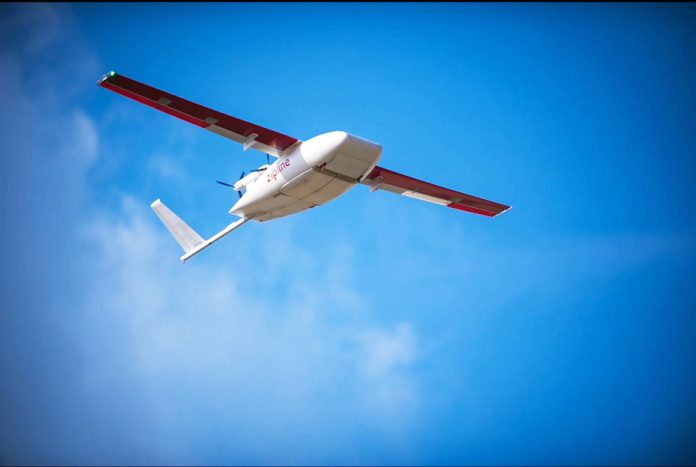Yaa Boatemaa, a 49-year-old woman was on a journey to her farm in Afijase in the Ashanti Region, with her thoughts fixed on the work ahead, when in an instant, her routine that Wednesday morning unraveled into a life-or-death struggle.
“I felt a sharp sting on my left leg as I walked through the bush,” Yaa recalled, her voice laced with lingering fear. “I looked down and saw the snake slithering away. My heart sank. I knew it was serious.” Panic set in as the venom began its swift and silent attack on her body.
When she was rushed to the Kona Health Center, her worst fears were confirmed: the clinic was out of anti-venom. It was a blow as devastating as the bite itself.
“I thought that was the end for me. I felt scared because I’ve heard stories of others who didn’t make it after snakebite.”
But Yaa’s story took a miraculous turn when Emmanuel Kofi Brantuo, a Deputy Chief Physician Assistant picked up his phone and swiftly contacted Zipline, a drone delivery service firm that delivers critical medical supplies.
Within fifteen minutes, a small drone appeared in the sky, whirring like a tiny savior. For Yaa, the sight was surreal. “A drone? Bringing medication? I couldn’t believe it,” she said, her expression a mix of disbelief and hope.
The package was retrieved, and the anti-venom was immediately prepared. As the injection coursed through her veins, Yaa felt relief replacing the venom’s deadly grip. “It was like my life was given back to me,” she said, gratitude shining in her eyes.
Emmanuel Kofi Brantuo, the Deputy Chief Physician Assistant at the Kona Health Center in the Ashanti Region said the health center was out of anti-venom, a grim reality in many rural healthcare facilities.
He knew time was critical. “When she came in, we didn’t have anti-snake venom,” he recalls. Acting quickly, he reached out to Zipline, a drone delivery service specializing in medical logistics. “I sent the request, and within 15 to 20 minutes, the drone arrived with the medication.”
The anti-venom arrived just in time to save Yaa’s life. But the day wasn’t over yet. “Shortly after Yaa left, another snakebite case came in,” Brantuo says. “Fortunately, we had requested two doses, and the second was used for this patient. That day, Zipline helped us save two lives.”
Now recovered, Yaa reflects on her ordeal with a mix of awe and conviction. “This technology saved my life,” she said. “Without it, I wouldn’t be here today. For rural areas like ours, where healthcare resources are limited, this is a blessing.”
“If drones can bring life-saving medication in minutes, imagine what else they can do,” Akosua said passionately. “They bring hope where there was none.”
A Game-Changer for medical delivery
Mr. Brantuo’s reliance on drone delivery for medical supplies goes beyond emergencies. “We’ve been using Zipline for the past two to three years, a system backed by Ghana’s government to improve upon its medical supply systems for health facilities.
Zipline’s service operates 24/7, including weekends and holidays, providing consistent support for healthcare delivery in rural Ghana.
“You send a request, and within seconds, you receive feedback,” Brantuo shares. The service operates around the clock, delivering supplies even on holidays and weekends, often within minutes.
Over the past two to three years, Kona Health Center has relied on Zipline for a variety of essential medications, including insulin, anti-rabies vaccines, and even basic supplies like dextrose and paracetamol. “Previously, when we ran out of such drugs, we had to depend on regional facilities, which was both costly and time-consuming,” he explained.
The impact has been profound. “They have saved countless lives and reduced the financial and logistical stress on our facility.”
“This service has not only saved lives but also empowered rural health facilities to deliver care more effectively.”
The need for digital evolution
For the Zipline drone delivery system to function properly, first, health workers or customers place an order using text messages, or via WhatsApp and Phone call. Once the request is received, the fulfillment process begins where the Zipline team promptly picks and packages the requested supplies with precision.
Following this, the packed items are loaded into a drone, and the launch takes place. The drones, equipped with advanced navigation systems, autonomously head toward the designated delivery points. Upon arrival, the delivery phase ensures the safe and accurate release of the package using a parachute mechanism.
Finally, the drone returns to the hub, where it is recovered, recharged, and prepared for subsequent missions. This efficient workflow, which typically takes 40 minutes from order to delivery, addresses critical healthcare needs, particularly in remote and underserved areas.
But the platform needs other forms of evolution. The current platform lacks a modern system such as a digital application that allows health workers to make request for supplies, offering real-time data exchange opportunities to improve the entire program.
There have been hopes that Ghana will soon launch an app for these purposes, but Ebenezer Abankwa, said that won’t happen in Africa anytime soon due to operational challenges.
Speaking in an interview with this reporter, he highlighted that Zipline engineers explored developing an offline version of the app that could sync seamlessly with the company’s fulfillment system. However, the initiative failed to meet expectations.
Mr. Abankwa emphasized that unreliable internet connectivity, could affect the efficiency of such a digital evolution. “Imagine if there’s an emergency, and the order has to go through an app, but we face internet challenges—it could lead to delays,” he explained.
Zipline hopes its current arrangements can still be efficient but operating a system that is more digitally integrated and inclusive, is needed.
A seamless, automated, and data-driven healthcare delivery system that can enable real-time data sharing, digital payments and inventory tracking are critical for scaling healthcare delivery.
Rwanda and the U.S., where Zipline operates with digital systems have seen enhanced efficiency, reduced delays, and improved accessibility to medical supplies.
Replicating this system in Ghana would transform healthcare delivery, allowing for real-time coordination, reducing errors associated with manual systems, and streamline payments for such medical delivery services.
For Ghana to achieve its Universal Health Coverage goals by 2030, integrating such technologies across the health sector is essential, as it enhances equity and responsiveness to medical emergencies.
However, scaling up DPI technologies like drones requires deliberate policies and investments. “Governments must establish clear regulations to foster innovation while ensuring security, privacy, and data interoperability,” Gabi Adotevi, Regional Head for West Africa at MOSIP, said.
This report is produced under the DPI Africa Journalism Fellowship Programme of the Media Foundation for West Africa and Co-Develop.









